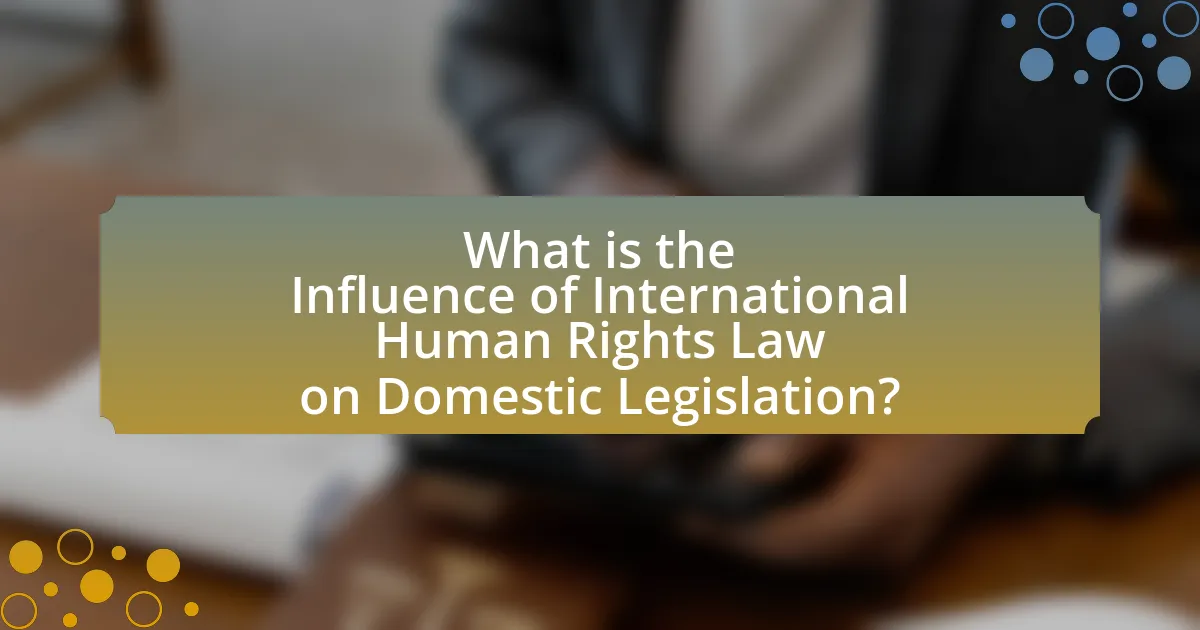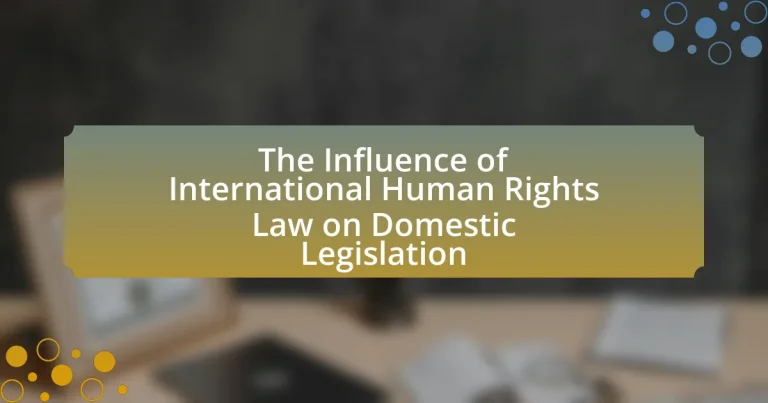The article examines the influence of International Human Rights Law on domestic legislation, highlighting how international standards shape national legal frameworks. It discusses the incorporation of treaties, such as the International Covenant on Civil and Political Rights, into domestic laws, leading to reforms that protect individual rights and promote accountability. Key principles of human rights law, including universality and equality, are explored, along with the challenges of aligning international norms with local contexts. The article also addresses the role of civil society in advocating for compliance and the consequences of non-compliance for countries on the global stage.

What is the Influence of International Human Rights Law on Domestic Legislation?
International Human Rights Law significantly influences domestic legislation by establishing standards that countries are expected to incorporate into their legal frameworks. This influence is evident in the adoption of laws that align with international treaties, such as the International Covenant on Civil and Political Rights, which mandates protections for individual rights. For instance, many nations have reformed their legal systems to include anti-discrimination laws and protections for freedom of speech, reflecting commitments made under international human rights agreements. Additionally, the incorporation of international human rights norms into domestic law often leads to enhanced judicial review processes, allowing courts to interpret national laws in light of international standards, thereby reinforcing the rule of law and accountability.
How does International Human Rights Law shape domestic legal frameworks?
International Human Rights Law significantly shapes domestic legal frameworks by establishing standards that countries are expected to incorporate into their national legislation. This incorporation often occurs through the ratification of international treaties, such as the International Covenant on Civil and Political Rights, which obligates states to align their laws with the rights enshrined in these agreements. For instance, many countries have amended their constitutions or enacted new laws to protect freedoms such as speech, assembly, and due process, reflecting their commitments under international law. Additionally, domestic courts frequently reference international human rights norms when interpreting national laws, thereby reinforcing the influence of these international standards on local legal practices.
What are the key principles of International Human Rights Law?
The key principles of International Human Rights Law include universality, indivisibility, interdependence, and equality. Universality asserts that human rights apply to all individuals without exception, as established in the Universal Declaration of Human Rights adopted by the United Nations in 1948. Indivisibility emphasizes that all rights, whether civil, political, economic, social, or cultural, are equally important and cannot be prioritized over one another. Interdependence highlights that the realization of one right often depends on the fulfillment of others, such as the right to education being linked to the right to freedom of expression. Equality mandates that all individuals are entitled to their rights without discrimination, as reinforced by various international treaties, including the International Covenant on Civil and Political Rights. These principles collectively guide the implementation and enforcement of human rights standards globally.
How do these principles translate into domestic laws?
International human rights principles translate into domestic laws through the incorporation of treaties and conventions into national legal frameworks. Countries often ratify international human rights treaties, which then require them to amend or create domestic laws that align with these international standards. For example, the Convention on the Elimination of All Forms of Discrimination Against Women (CEDAW) has led many nations to enact laws promoting gender equality and protecting women’s rights. This process is evidenced by the legislative changes in countries like Canada and Sweden, where international commitments have directly influenced domestic policies and legal protections.
Why is the relationship between International Human Rights Law and domestic legislation important?
The relationship between International Human Rights Law and domestic legislation is important because it ensures that international human rights standards are integrated into national legal frameworks, promoting accountability and protection of individual rights. This integration allows countries to fulfill their international obligations, as seen in the Universal Declaration of Human Rights, which sets a global benchmark for human rights that nations are expected to uphold. Furthermore, when domestic laws reflect international human rights principles, it enhances the legal recourse available to individuals whose rights have been violated, thereby strengthening the rule of law and fostering a culture of respect for human rights within the society.
What impact does this relationship have on citizens’ rights?
The relationship between international human rights law and domestic legislation significantly enhances citizens’ rights by providing a framework for legal protections and accountability. This influence ensures that domestic laws align with international standards, thereby safeguarding individual freedoms and promoting equality. For instance, countries that ratify international treaties, such as the International Covenant on Civil and Political Rights, are obligated to implement laws that protect citizens from discrimination and uphold their rights to free expression and assembly. This alignment often leads to the establishment of legal recourse for citizens whose rights are violated, as seen in various judicial systems that incorporate international human rights norms into their legal frameworks.
How does it affect government accountability?
International human rights law enhances government accountability by establishing legal standards that require states to uphold individual rights and freedoms. This framework compels governments to be transparent and responsive to their citizens, as failure to comply can lead to international scrutiny and potential sanctions. For instance, the Universal Declaration of Human Rights and various treaties obligate states to report on their human rights practices, thereby creating mechanisms for accountability. Additionally, domestic courts often reference international human rights norms when adjudicating cases, further reinforcing the expectation that governments must adhere to these standards.
What challenges arise from the influence of International Human Rights Law on domestic legislation?
The challenges arising from the influence of International Human Rights Law on domestic legislation include conflicts between international standards and national laws, difficulties in implementation, and resistance from local political or cultural contexts. Conflicts often occur when domestic laws do not align with international human rights obligations, leading to legal ambiguities and potential violations. Implementation challenges arise due to insufficient resources, lack of training for law enforcement, and inadequate judicial systems, which hinder the effective application of international norms. Additionally, local resistance can stem from cultural beliefs or political ideologies that prioritize national sovereignty over international commitments, complicating the integration of human rights principles into domestic legal frameworks.
What are the common conflicts between international and domestic laws?
Common conflicts between international and domestic laws arise primarily from differences in legal obligations, interpretations, and enforcement mechanisms. For instance, international treaties may require states to uphold certain human rights standards that domestic laws do not recognize or protect, leading to inconsistencies. An example is the conflict between the United Nations Convention on the Rights of the Child, which mandates specific protections for children, and domestic laws that may not provide equivalent safeguards. Additionally, domestic courts may prioritize national sovereignty over international obligations, resulting in non-compliance with international law. These conflicts highlight the challenges in harmonizing international human rights standards with varying domestic legal frameworks.
How do cultural differences impact the implementation of international standards?
Cultural differences significantly impact the implementation of international standards by influencing how these standards are perceived and integrated within local contexts. For instance, varying cultural values can lead to differing interpretations of human rights, affecting compliance and enforcement. Research by the United Nations Development Programme highlights that countries with collectivist cultures may prioritize community rights over individual rights, which can hinder the adoption of international human rights standards that emphasize individualism. Additionally, cultural norms surrounding authority and governance can affect the willingness of local institutions to adopt international frameworks, as seen in regions where traditional practices conflict with modern legal standards.
How do countries incorporate International Human Rights Law into their legal systems?
Countries incorporate International Human Rights Law into their legal systems primarily through the adoption of domestic legislation that aligns with international treaties and conventions. For instance, many nations ratify international human rights treaties, such as the International Covenant on Civil and Political Rights, and subsequently enact laws that reflect the obligations outlined in these treaties. This process often includes constitutional amendments, the creation of specific human rights laws, and the establishment of institutions to monitor compliance.
A concrete example is South Africa, which, after the end of apartheid, incorporated international human rights standards into its Constitution, explicitly referencing international law in its Bill of Rights. This incorporation ensures that domestic courts can apply international human rights norms directly, thereby enhancing the protection of individual rights within the country.
What methods are used to align domestic laws with international standards?
Methods used to align domestic laws with international standards include legislative reform, judicial interpretation, and policy development. Legislative reform involves amending existing laws or enacting new legislation to comply with international treaties and conventions, such as the Convention on the Rights of the Child, which many countries have ratified and subsequently integrated into their legal frameworks. Judicial interpretation occurs when courts interpret domestic laws in a manner consistent with international human rights standards, often referencing international legal principles in their rulings. Policy development entails creating guidelines and frameworks that promote adherence to international norms, often facilitated by governmental and non-governmental organizations working together to ensure compliance and implementation. These methods collectively enhance the alignment of domestic laws with international standards, fostering a more cohesive legal environment that respects human rights.
How do judicial systems interpret international human rights obligations?
Judicial systems interpret international human rights obligations by integrating these obligations into domestic law, often through constitutional provisions or statutory frameworks. Courts analyze international treaties and customary international law to ensure compliance with human rights standards, applying principles of interpretation that prioritize the protection of individual rights. For instance, the European Court of Human Rights frequently references the European Convention on Human Rights to guide national courts in their rulings, thereby reinforcing the obligation of states to uphold human rights as defined in international law. This practice demonstrates the judiciary’s role in bridging international norms with domestic legal systems, ensuring that international human rights obligations are effectively enforced at the national level.
What are the consequences of non-compliance with International Human Rights Law?
Non-compliance with International Human Rights Law can lead to severe consequences, including legal repercussions, international sanctions, and damage to a country’s reputation. States that fail to adhere to these laws may face actions from international bodies such as the United Nations, which can impose sanctions or take measures to hold violators accountable. For instance, the International Criminal Court can prosecute individuals for crimes against humanity, highlighting the legal ramifications of non-compliance. Additionally, countries may experience diplomatic isolation and loss of foreign aid, as seen in cases where nations have been sanctioned for human rights abuses, such as North Korea and Venezuela. These consequences underscore the importance of adherence to international human rights standards in maintaining global order and accountability.
What legal repercussions can countries face?
Countries can face legal repercussions such as sanctions, international lawsuits, and loss of diplomatic relations when they violate international human rights laws. For instance, the United Nations can impose economic sanctions on nations that fail to adhere to human rights treaties, as seen with North Korea and Iran, which faced sanctions due to human rights abuses. Additionally, countries may be taken to international courts, such as the International Criminal Court, for crimes against humanity, exemplified by the cases against leaders in Sudan and Libya. These repercussions serve to enforce compliance with international human rights standards and hold nations accountable for their actions.
How does non-compliance affect international relations?
Non-compliance with international agreements negatively impacts international relations by eroding trust among nations. When a country fails to adhere to treaties or human rights obligations, it can lead to diplomatic tensions, sanctions, or even conflict, as seen in cases like North Korea’s nuclear program, which has resulted in widespread international condemnation and isolation. Furthermore, non-compliance undermines the effectiveness of international law, as demonstrated by the lack of enforcement mechanisms in many human rights treaties, leading to a cycle of disregard for commitments and further deterioration of diplomatic ties.
What best practices can enhance the influence of International Human Rights Law on domestic legislation?
Incorporating International Human Rights Law into domestic legislation can be enhanced through several best practices. First, aligning national laws with international human rights treaties ensures compliance and strengthens legal frameworks. For instance, countries that ratify the Convention on the Elimination of All Forms of Discrimination Against Women often amend their domestic laws to reflect its principles, thereby promoting gender equality.
Second, establishing mechanisms for monitoring and reporting on human rights practices can facilitate accountability. Countries like South Africa have implemented independent human rights commissions that assess compliance with international standards, providing recommendations for legislative reforms.
Third, engaging civil society in the legislative process fosters public awareness and advocacy for human rights. In Brazil, collaboration with NGOs has led to the successful integration of human rights considerations into public policy, demonstrating the impact of grassroots involvement.
Lastly, providing training for lawmakers and judicial officials on international human rights norms enhances understanding and application in domestic contexts. Training programs in countries such as Canada have resulted in more informed decision-making that aligns with international standards.
These practices collectively contribute to a more robust integration of International Human Rights Law into domestic legislation, promoting a culture of respect for human rights.
How can governments effectively engage with international human rights bodies?
Governments can effectively engage with international human rights bodies by actively participating in their mechanisms, such as submitting periodic reports, responding to inquiries, and implementing recommendations. This engagement demonstrates a commitment to upholding human rights standards and fosters accountability. For instance, countries that regularly submit reports to the United Nations Human Rights Council show transparency and willingness to address human rights issues, which can lead to constructive dialogue and support from these bodies. Additionally, incorporating feedback from international human rights bodies into domestic legislation can enhance legal frameworks and improve human rights protections, as evidenced by nations that have reformed laws following recommendations from the Universal Periodic Review process.
What role do civil society organizations play in promoting compliance?
Civil society organizations play a crucial role in promoting compliance with international human rights law by advocating for accountability, transparency, and the protection of rights. These organizations engage in monitoring government actions, raising public awareness, and providing legal assistance to individuals whose rights have been violated. For instance, according to a report by the United Nations Human Rights Council, civil society organizations have been instrumental in documenting human rights abuses and pressuring governments to adhere to international standards, thereby influencing domestic legislation to align with these norms. Their efforts contribute to a more informed citizenry and foster a culture of respect for human rights, ultimately leading to stronger compliance mechanisms within states.

